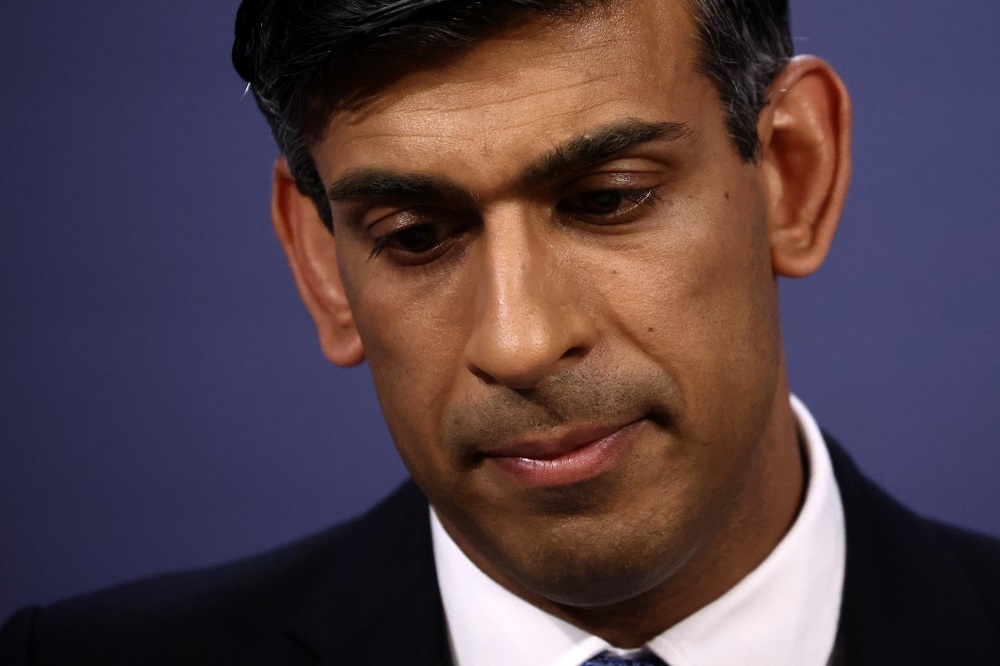Sunak faces new year showdown with Tories over Rwanda policy after Commons win

Rishi Sunak faces a new year showdown over his Rwanda deportation policy after right-wing Conservative MPs said they could vote emergency legislation down if it is not tightened.
The Prime Minister on Tuesday won a crunch vote on the Safety of Rwanda Bill after spending the day in talks with potential rebels to avoid a defeat on his flagship “stop the boats” pledge.
The efforts to bring people on side worked, with MPs approving the Bill at second reading by 313 votes to 269, giving the UK Government a winning majority of 44.
But right-wing Tory factions said they reserved the right to vote against the draft law when it returns to the Commons next year if its contents are not strengthened to ensure asylum seekers can be deported to Rwanda before the next election.
Abstentions
Former home secretary Suella Braverman and former immigration minister Robert Jenrick, who resigned last week following publication of the Bill, were among the high profile Tories to abstain on Tuesday, despite being issued a three-line whip to vote in support of the Government.
Dozens abstained but no Tory MP voted against the Bill, with former party leader Sir Iain Duncan Smith and former business secretary Jacob Rees-Mogg among those to back it.
A piece of government legislation has not failed to pass a second reading, the first Commons hurdle, since 1986.
Mr Sunak said the victory in the Commons for the Bill would pave the way for him to deliver his pledge of stopping boats of migrants from crossing the Channel.
After the result, the Prime Minister tweeted: “The British people should decide who gets to come to this country – not criminal gangs or foreign courts.
“That’s what this Bill delivers.
“We will now work to make it law so that we can get flights going to Rwanda and stop the boats.”
Legal challenges
The emergency legislation, introduced after the Supreme Court ruled that the Rwanda proposal is unlawful as written, is designed to prevent migrants who arrive via unauthorised routes from legally challenging being deported to Rwanda.
The Bill seeks to revive the stalled deportation plan by attempting to prohibit legal challenges based on the argument that Rwanda is unsafe.
It allows ministers to disapply the Human Rights Act but does not go as far as overriding the European Convention on Human Rights, something which Tory hardliners have urged is needed for the policy to be enacted.
The Home Office has paid £240 million to Kigali so far, with another payment of £50 million anticipated in 2024/25, but no deportation flights have yet taken off.
Mark Francois, chairman of the European Research Group (ERG) of Eurosceptic Tories, announced ahead of the Commons vote that his group and four other right-wing factions — the self-described “five families” — would be abstaining, with a view to putting forward amendments early next year.
The other factions include the New Conservatives, Common Sense Group, Conservative Growth Group and Northern Research Group.
The ERG leader said Mr Sunak had told colleagues he was “prepared to entertain tightening the Bill” and that, if the Prime Minister does not accept changes to ensure that happens, then the five caucuses “reserve the right to vote against” the Government at the next stage.
Rebel
A Tory rebel source told PA news agency: “This Bill has been allowed to live another day.
“But without amendments it will be killed next month. It is now up to the Government to decide what it wants to do.”
Downing Street has indicated it will listen to changes suggested by MPs but has not committed to accepting amendments.
Former Supreme Court judge Lord Sumption predicted that there is likely to be a “clash” with European judges over the Bill, something that would likely enrage Mr Sunak’s Tory critics.
Lord Sumption told BBC’s Newsnight that the Bill “is contrary to international law” because it seeks to “block people off from access to the courts, and not allow them to argue the contrary to what Parliament has now declared”.
He added: “Sooner or later there may be a clash with the Strasbourg (European) Court of Human Rights, which will pay absolutely no attention to domestic UK legislation.”
The threat of a rebellion on the right of the party means Mr Sunak faces a narrow path to ensuring his emergency legislation becomes law.
If all non-Conservative MPs oppose the plan, a revolt by 29 Tories could be enough to defeat the Safety of Rwanda Bill at its next test in Parliament.
After the upcoming committee stage, there will be a third reading vote before the Bill is sent to the House of Lords, where it is expected to face heavy scrutiny.
Tory moderates urged Mr Sunak to stay the course and continue with the legislation as it is following his Commons victory.
MPs in the One Nation caucus agreed to back the Bill this week but have stressed that they will resist any amendments from the right that would risk the UK breaching the rule of law and its international obligations.
Damian Green, the group’s chairman, told Newsnight the Prime Minister had secured a “pretty solid” majority for his proposal and that he hoped the “third reading would go through reasonably easily”.
“On today’s vote, the Government has more or less managed the narrow landing strip that it is aiming at, and so it should stick to that landing strip,” the former de facto deputy prime minister said.
Support our Nation today
For the price of a cup of coffee a month you can help us create an independent, not-for-profit, national news service for the people of Wales, by the people of Wales.








Do thet really think that sending a few desperate people to Rwanda BEFORE the next election is going to save them from an electoral defeat on a scale they can barely imagine?